Latest Bluefin Tuna In season Adjustment
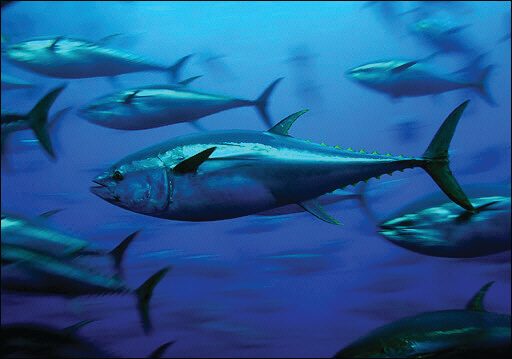
The National Marine Fisheries Service is adjusting the Atlantic bluefin tuna (BFT) General category daily retention limit from three large medium or giant BFT per vessel per day/trip to ONE large medium or giant BFT per vessel per day/trip for the remainder of the June through August 2019 subquota period. This action is based on consideration of the regulatory determination criteria regarding inseason adjustments and applies to Atlantic Tunas General category (commercial) permitted vessels and Highly Migratory Species (HMS) Charter/Headboat category permitted vessels with a commercial sale endorsement when fishing commercially for BFT. DATES: Effective July 11, 2019
Help Keep Pelagic Longlines OUT of Closed Zones
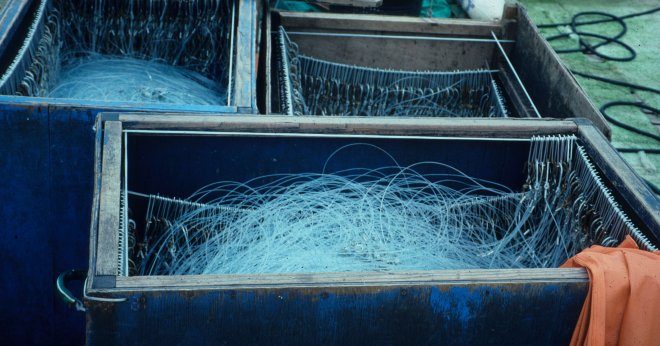
The U.S. pelagic longline closed zones and gear restricted areas were established to reduce bycatch of juvenile swordfish by protecting nursery grounds, overfished marlin, sailfish, which remain overfished, large coastal sharks (some remain overfished), marine mammals and loggerhead (“Threatened” under the Endangered Species Act) and leatherback sea turtles (Endangered under the ESA). At the time the U.S. fleet was not landing its swordfish quota, rather it was catching 80% of the Atlantic-wide undersize swordfish, reported as dead discards until international management decided that practice had to stop by 2004. Authorizing pelagic longline vessels back into juvenile swordfish nursery areas
Atlantic Bluefin Tuna In-Season Adjustment
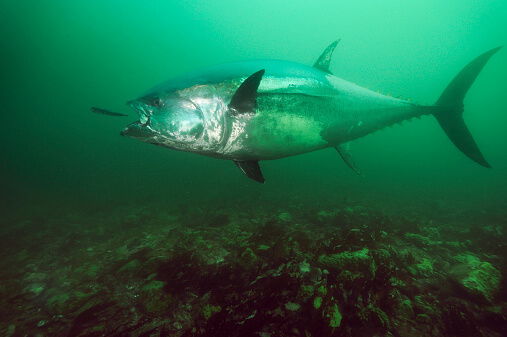
Bluefin Tuna Angling Category Northern Area Trophy Fishery to Close June 27, 2019 Notice – NOAA Fisheries has determined that the subquota of 1.8 mt for the Angling category northern area trophy bluefin tuna fishery has been reached. The incidental Angling category fishery for trophy bluefin tuna in the northern area will close effective 11:30 p.m., […]
Atlantic bluefin tuna inseason adjustment

Based on the best available landings information, NOAA Fisheries has determined that the subquota of 1.8 mt for the Angling category northern area trophy bluefin tuna fishery has been reached. The incidental Angling category fishery for trophy bluefin tuna in the northern area will close effective 11:30 p.m., June 27, 2019, through December 31, 2019. Trophy bluefin are those measuring 73 inches or greater. The northern area is the area north of 39°18’N (off Great Egg Inlet, NJ). More information can be found in the Federal Register. Persons aboard vessels permitted in the Atlantic HMS Angling and Atlantic HMS
Swordfish General Commercial Permit Retention Limit Adjustment
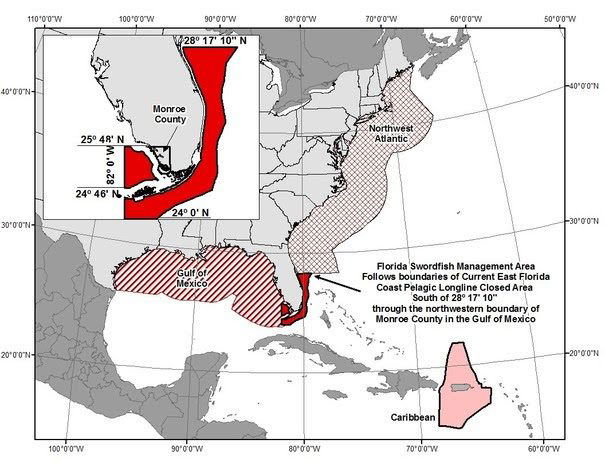
NOAA Fisheries just announced an inseason change to the Swordfish General Commercial permit retention limits in the Northwest Atlantic, Gulf of Mexico, and U.S. Caribbean regions, as shown in the table below. The default Swordfish General Commercial permit retention limit of zero (0) swordfish in the Florida Swordfish Management Area remains the same. See below for a map of the regions. This action is effective July 1 through December 31, 2019, unless changed via subsequent action. These retention limits apply to vessels issued a Swordfish General Commercial permit or a Highly Migratory Species Charter/Headboat permit with a commercial endorsement when on a non
New Exempted Fishing Permits for Longlines off US West Coast
Exempted Fishing Permits were issued by the Pacific Fishery Management Council on April 29, 2019 to two vessels to fish off the U.S. west coast in federal waters (Exclusive Economic Zone) with pelagic longline gear. The listed purpose is to collect data about the performance of shallow-set (pelagic) longline gear and mitigation measures to minimize adverse environmental impacts. Restrictions include 100% observer coverage, strict limits on incidental hooking, entanglements and mortality of loggerhead and leatherback sea turtles, no fishing within Southern California Bight (Santa Barbara County south to the border with Mexico) and within leatherback sea turtle critical habitat
More Atlantic Bluefin Tuna Allocation for Anglers?
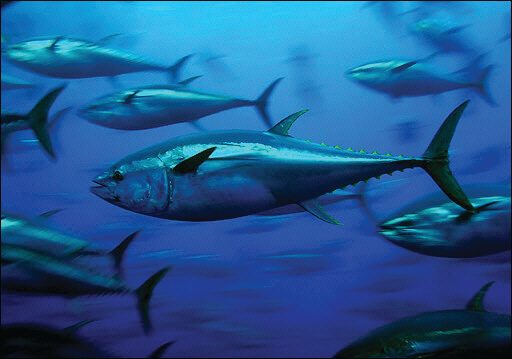
The National Marine Fisheries Service (NMFS) recently released an Options Paper to amend the current Individual Bluefin Quota (IBQ) strategy, implemented to reduce incidental bycatch of bluefin, in the pelagic longline fishery for public review. The allocation of bluefin tuna to all user categories may be changed. Why should the recreational community care? For two primary reasons, the NMFS is advancing an amendment (13) to the Atlantic Consolidated Fishery Management Plan for Highly Migratory Species. One, the U.S. commercial fleet is not landing its international allocated Atlantic bluefin quota, leaving the unused portion subject to reallocation to other
NMFS Discussing New Ways to Allow Commercial Fishing Vessels Inside Closed Zones
NEEDS ALL ANGLERS ATTENTION – The National Marine Fisheries Service (NMFS) launched a new and very comprehensive process for evaluating the success or inefficiencies of current Pelagic Longline Closed Zones and Gear Restricted Areas to achieve full swordfish quota utilization and reduction of seafood trade imbalance. The text makes clear billfish are not priorities for NMFS, rather pelagic longline fishing for tuna and swordfish are priorities with sea turtles, marine mammals, and sharks. TBF will be issuing a CALL TO ACTION soon. Details provided below: To evaluate success or inefficiencies of current Pelagic Longline Closed Zones and
2019 Recreational Atlantic Billfish Landings Updates
NOAA just released the 1st quarter landing update for the recreational fishing community. While only 1 blue marlin has been landed in the 1st quarter, we expect the number of fish to be reported will increase by the 2nd quarter due to tournament season. Landings are compiled using self-reported angler reports from the Atlantic Highly Migratory Species Non-Tournament Recreational Swordfish and Billfish Landings Database; tournament landings from the Atlantic Tournament Registration & Reporting system; catch card reports from North Carolina and Maryland; and individual billfish intercepted by the Large Pelagic Survey and Marine Recreational Information Program. Please note that
Bluefin Tuna Angling Category Gulf of Mexico Area Trophy Fishery Closure!
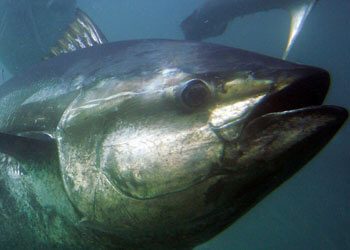
NOAA Fisheries has determined that the subquota of 1.8 mt for the Angling category Gulf of Mexico trophy bluefin tuna fishery has been reached. Trophy bluefin are those measuring 73 inches or greater. The incidental Angling category fishery for trophy bluefin tuna in the Gulf of Mexico will close effective 11:30 p.m., May 31, 2019, through December 31, 2019. More information can be found in the Federal Register notice. Persons aboard vessels permitted in the Atlantic HMS Angling and Atlantic HMS Charter/Headboat categories fishing recreationally in the Gulf of Mexico may not retain, possess, or land large medium




